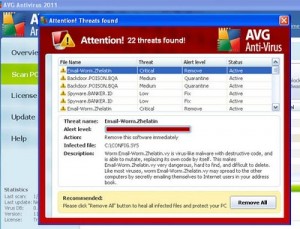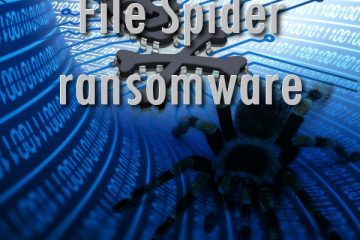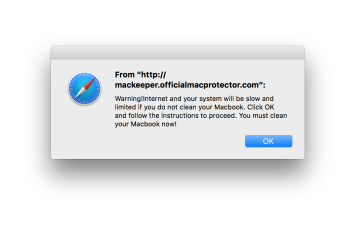A goal of typical fake antivirus program is convincing you into giving away your credit card details. This can be done in several ways:
1. Simulating PC problems: showing porn, slowing it down, blocking other programs. This forces users into searching for solution to make PC usable. Quite often fake antiviruses try leaving user no other choice than purchasing the program.
2. Directly scaring about threats – creating “magic” PC scanners that can detect PC problems through network in seconds. Typically, these problems involve keyloggers, info stealers and similar applications that can cause major monetary loss
3. Impersonating legitimate software or brand to win user’s trust. Sure, the most favorite brand is Microsoft, but quite often other brands suffer.
Even if typical rogues involve 1,2, there is a significant wave of programs that mimic legitimate brands. The last one would be fake AVG Antivirus 2011 – a clone of Antivirus 8, Antivirus GT and other rogues. This time it targets AVG brand, and copies legitimate program design. This tactics is likely to work because of 2 reasons: Most people have heard about legitimate AVG, which is decent and popular antivirus, and it is hard to find negative information about AVG antivirus 2011 in the net that would warn user from purchasing the rogue.
Many users know little about Antivirus market and AVG itself. They ha ve heard that many people use it, they might have seen its logo or design. But they know little about how AVG should be distributed or why this “AVG” does not uninstall normally. Googling about AVG Antivirus 2011 uninstall problems will not lead to many related results, as the ways to uninstall legitimate AVG differs from ones used for removing fake version.
ve heard that many people use it, they might have seen its logo or design. But they know little about how AVG should be distributed or why this “AVG” does not uninstall normally. Googling about AVG Antivirus 2011 uninstall problems will not lead to many related results, as the ways to uninstall legitimate AVG differs from ones used for removing fake version.
Now worst thing one can do is purchasing fake AVG antivirus 2011. Even if one agreed to spend some money on antivirus, the credit card details are likely to be misussed by the makers of the fake antivirus. Thus it is best to change compromised credit card in your bank.
If you look for solution for Fake AVG Antivirus 2011 problems, try my guide at 2-viruses.com. Alternatively, Malware researcher Xilibox created a tool to help register this rogue for free. However, whatever way you choose, scan your PC with decent anti-malware tools afterwards. Do not leave trojans around, or you will see new skin of this rogue family again.
Funnily enough, this is not a sole rogue that impersonates AVG these days – Here is MCAVG too. AVG is doing something right, I think.



1 Comment
Online reputation management strategy used by malware makers · April 6, 2012 at 7:40 am
[…] Another cunning way is imitating legitimate programs. This is done by using names and designs similar to legitimate programs. Sometimes it is nearly impossible to distinguish legitimate program from a copy as long as you are not familiar with the first one. The search reviews will be positive. So it is important to double-check the designs on official sites with the ones showing warnings on your PC. We have covered this way in detail in the post about imitation before. […]